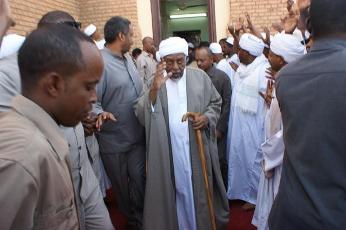Rifts deepen within DUP over participation in Sudan’s government
November 21, 2011 (KHARTOUM) – The controversy surrounding the possible participation of the opposition Democratic Unionist Party (DUP) in the upcoming government has gained in intensity as the ruling National Congress Party (NCP) confirmed the former’s agreement to join.

The meeting, which was held under tight security presence to prevent anti-participation members of the DUP from demonstrating, had failed to reach an agreement and the attendants finally agreed to ask the NCP to “improve the offer” for participation and sign memorandums of understandings on solving the crises in Darfur, Blue Nile and South Kordofan.
Meanwhile, a number of DUP’s prominent members have reportedly walked out of the meeting in protest after the party’s chairman Mohamed Osman Al-Mirghani shrugged off their threats to resign if the DUP agreed to participate in the government.
Hassan Abu Sabib, one of two senior DUP members who walked out of the meeting, told reporters that Al-Mirghani had told them during the meeting that “whoever wants to resign should go ahead.”
Abu Sabib later declared that he had decided to resign and added that he would not be part of a group heading towards participation in a “totalitarian regime.” He went on to accuse unnamed DUP members of hatching a plot to bring the party to participate in the government.
According to the sources, the DUP’s leader Mohamed Osman Al-Mirghani refused during the meeting to agree to a proposal authorizing him to make a decision about participation.
The sources said that Mirghani insisted on reaching a consensus among the party’s leading members to endorse participation.
Al-Mirghani was forced on Saturday to call off a party meeting expected to officialise participation after a faction opposed to rapprochement with the NCP held demonstration at the premises of the party in Khartoum North.
The NCP’s offer for the DUP to participate in Sudan’s first national government since the breakup of the country in July this year includes a presidential assistant, three federal ministers, two state ministers and 12 ministers in different states.
A senior NCP official speaking on condition of anonymity to Sudan Tribune declined to confirm whether the demand for improving the offer was accepted but he said his party had received a confirmation from the DUP that it would join the government.
He further added that the DUP was expected to name its candidates for government ministries within the coming hours.
Meanwhile, the DUP’s deputy chairman Ali Mahmoud Hassanein, who is known for his staunch opposition to the NCP, issued a strongly worded statement repudiating any attempts to include the party in the NCP-led government.
In his statement, Hassanein described the NCP’s regime as “a moribund authority” and said that those seeking participation in the government represent only themselves and had nothing to do with the DUP.
According to the DUP’s deputy chairman, participating in the NCP’s “totalitarian” regime represents treason and a violation of the party’s constitution.
The division-riddled DUP was one of few parties which did not boycott April 2010 national elections whose disputed results had returned the NCP to power with an overwhelming majority in the parliament.
The NCP kept the announcement of the new government on hold for more than four months in waiting of an agreement by the DUP to participate after the National Umma Party (NUP) of former Prime Minister Sadiq Al-Mahdi refused to participate.
Analysts see the NCP’s quest to include the DUP in the government as an attempt to substantiate its claims of legitimacy and contain tension in the domestic political arena.
(ST)
